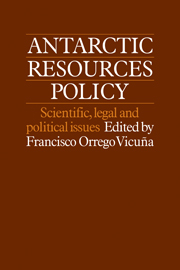Book contents
- Frontmatter
- Contents
- List of contributors
- 1 Antarctic resources policy: an introduction
- Part one The state of Antarctic knowledge and experience
- Part two The policy for the conservation of the living resources of Antarctica
- Part three The policy for the exploration and exploitation of the mineral resources of Antarctica
- Part four Issues on Antarctica and the law of the sea
- Part five The policy for Antarctic cooperation
- 20 Antarctica's role in international relations
- 21 Alternatives for cooperation and institutionalization in Antarctica: outlook for the 1990s
- 22 Resource development in polar regions: comments on technology
20 - Antarctica's role in international relations
Published online by Cambridge University Press: 06 July 2010
- Frontmatter
- Contents
- List of contributors
- 1 Antarctic resources policy: an introduction
- Part one The state of Antarctic knowledge and experience
- Part two The policy for the conservation of the living resources of Antarctica
- Part three The policy for the exploration and exploitation of the mineral resources of Antarctica
- Part four Issues on Antarctica and the law of the sea
- Part five The policy for Antarctic cooperation
- 20 Antarctica's role in international relations
- 21 Alternatives for cooperation and institutionalization in Antarctica: outlook for the 1990s
- 22 Resource development in polar regions: comments on technology
Summary
Antarctica, as such, became a specific object of international relations only recently, in the twentieth century. Although earlier there had been expeditions to that region, it was only in this century that Antarctica began to play a full role as an active factor in international politics and began to pose a problem in the field of international relations.
We can define four distinct periods with regard to this subject. The first lasted until 1945. The second stage spanned the period from 1945 to 1959. The third began in 1959 and lasted until the 1970s, while the fourth extends from the mid-1970s onward.
The first manifestations of Antarctica's role
During the first stage, Antarctica was seen as a minor matter of limited international interest, which resulted from activities in localized areas or expeditions. In other words, it was not seen as a geopolitical unit. The various countries focused on partial aspects of the region, while its identity as a whole went unconsidered. From that point of view, the sector proved to be a convenient solution, at the same time that it reflected a conceptual reality which, however, rested on differing principles.
Even at the outset, it was clear that the geo-climatic situation in Antarctica presented characteristics which differentiated it from the rest of the globe. The harshness of the environment meant that human beings could not settle there in a normal fashion; a comprehensive application of the established principles of classic international law in the region was therefore also impossible.
- Type
- Chapter
- Information
- Antarctic Resources PolicyScientific, Legal and Political Issues, pp. 267 - 280Publisher: Cambridge University PressPrint publication year: 1983
- 2
- Cited by



